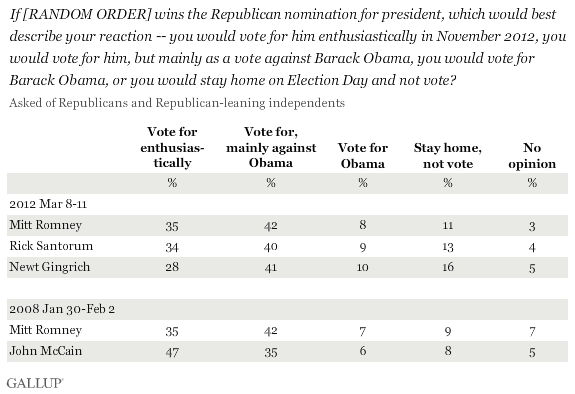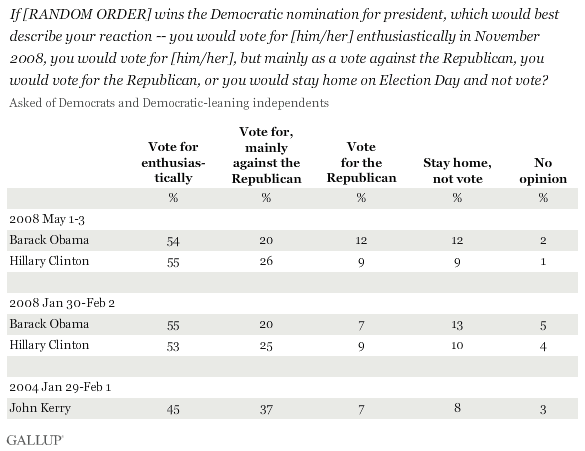PRINCETON, NJ -- A little more than one-third of Republicans say they would vote "enthusiastically" for either Mitt Romney or Rick Santorum if either candidate were to win their party's nomination for president. Slightly fewer say they would vote enthusiastically for Newt Gingrich. This level of enthusiasm is similar to Republicans' feelings about voting for Romney in early 2008, but lower than the enthusiasm level for that year's eventual GOP nominee, John McCain.

These data are from a Gallup poll conducted March 8-11, 2012. The 35% of Republicans who at this point say they would vote "enthusiastically" for Mitt Romney for president if he were to win the GOP nomination is identical to the 35% of Republicans who said the same about Romney back in late January/early February 2008.
In that same 2008 poll, however, 47% of Republicans said they would vote enthusiastically for John McCain, who ended up as that year's GOP nominee. In short, Romney's enthusiasm deficit in 2008 has carried over to his current campaign, with the difference being that none of the other nominees this year are generating any more enthusiasm among Republicans than Romney is.
Republicans are also less enthusiastic about voting for their party's current pool of candidates than Democrats were about voting for their potential nominees in both 2008 and in 2004. More than half of Democrats in 2008 said they would vote "enthusiastically" for Barack Obama or Hillary Clinton if either were to win their party's presidential nomination. Forty-five percent of Democrats in late January/early February 2004 said they would vote enthusiastically for John Kerry for president.

These data reinforce the relatively tepid level of "positive intensity" generated by Romney, Santorum, and Gingrich among Republicans this year. In Gallup's early March measurement, Santorum had a Positive Intensity Score of +15, Romney +13, and Gingrich +4. By contrast, a number of other potential GOP candidates in 2011 at various times had Positive Intensity Scores in the +20 range, with Herman Cain's +34 at one point the highest measured. And, also by way of contrast, the pending Democratic nominee Barack Obama had a Positive Intensity Score among Democrats of +36 in early March.
Despite their relative lack of enthusiasm about specific candidates at this point, Republicans remain more enthusiastic than Democrats about voting in the presidential election in general. A mid-February USA Today/Gallup poll found that 53% of Republicans and 45% of Democrats were more enthusiastic than usual about voting in the November 2012 presidential election.
Implications
GOP presidential candidates Mitt Romney, Rick Santorum, Newt Gingrich, and former contenders Rick Perry and Herman Cain all enjoyed periods of time as the front-runner in the preferences of Republicans nationally during the past year -- only to fall back down again as rank-and-file Republicans continued their apparent search for a satisfactory nominee. The new data underscore Republicans' lack of satisfaction with the current candidates, particularly in contrast to Republicans' higher level of enthusiasm for McCain in the last election.
It is possible that Republicans will become more enthusiastic about their nominee once he is determined, and as the focus turns fully to the November general election. This is made more probable by the finding that Republicans are in general more enthusiastic about voting this year than are Democrats. Still, at the moment, the available data show that Republicans are suffering from a deficit in candidate enthusiasm, and don't appear to have an active candidate in sight whom they are excited to get behind.
Survey Methods
Results for this Gallup poll are based on telephone interviews conducted March 8-11, 2012, with a random sample of 457 Republicans and Republican-leaning independents, aged 18 and older, living in all 50 U.S. states and the District of Columbia.
For results based on the total sample of Republicans and Republican-leaning independents, one can say with 95% confidence that the maximum margin of sampling error is ±6 percentage points.
Interviews are conducted with respondents on landline telephones and cellular phones, with interviews conducted in Spanish for respondents who are primarily Spanish-speaking. Each sample includes a minimum quota of 400 cell phone respondents and 600 landline respondents per 1,000 national adults, with additional minimum quotas among landline respondents by region. Landline telephone numbers are chosen at random among listed telephone numbers. Cell phone numbers are selected using random-digit-dial methods. Landline respondents are chosen at random within each household on the basis of which member had the most recent birthday.
Samples are weighted by gender, age, race, Hispanic ethnicity, education, region, adults in the household, and phone status (cell phone only/landline only/both, cell phone mostly, and having an unlisted landline number). Demographic weighting targets are based on the March 2011 Current Population Survey figures for the aged 18 and older non-institutionalized population living in U.S. telephone households. All reported margins of sampling error include the computed design effects for weighting and sample design.
In addition to sampling error, question wording and practical difficulties in conducting surveys can introduce error or bias into the findings of public opinion polls.
View methodology, full question results, and trend data.
For more details on Gallup's polling methodology, visit https://www.gallup.com/.
